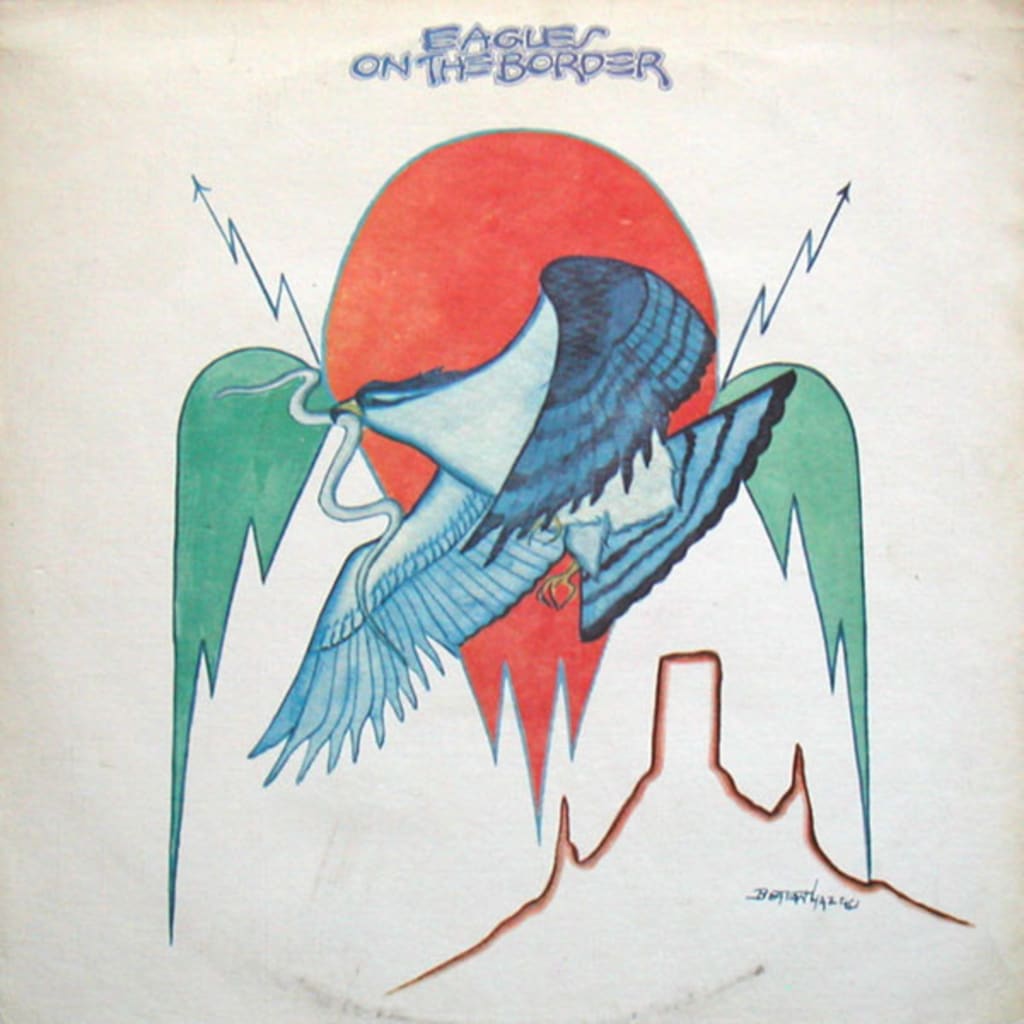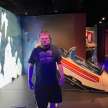'On The Border'
The Eagles' Transitional album

Following the relative disappointment of Desperado, at least in the minds of the group itself, the Eagles once again went to London to record their third album with producer Glyn Johns. However, the sessions began with a surly attitude between Johns and the band, and after just six weeks--in which they recorded only two songs--arguments with Johns over the sound of the recordings made the sessions unworkable. Don Henley and Glenn Fey decided to end the sessions with Johns, and return to Los Angeles to record at the Record Plant with Navy veteran Bill Sczymzyk, fresh off recording guitar hero Joe Walsh's hit LP The Smoker You Drink The Player You Get, and its still in rotation hit "Rocky Mountain Way."
One reason that the band was so impressed with the Walsh album and production is that the two leaders felt that more guitar muscle was needed to improve their sound. In fact, one of their complaints about Johns was his refusal to record them as more of a rock band, saying that the Eagles weren't The Who, one of his most high-profile clients. Bernie Leadon, Frey felt, was too much of a country guitarist and felt that adding a guitarist with greater rock proficiency was in order. So the band brought in Leadon's high school friend (and Tom Petty's guitar teacher) Don Felder, who had recently been on tour with David Crosby and Graham Nash. Felder only appeared on a few tracks on the album, but the group appreciated his input and he was offered a "permanent" spot in the group.
Around the same time, David Geffen sold Asylum Records to Warner Brothers leaving the Eagles temporarily without a manager as Geffen had to divest in his management company to fill a chairman role at Warner Brothers. To fill the vacancy in stepped Irving Azoff, a tough manager whose clients already included Walsh and Eagle associate Dan Fogelberg.
With two tracks kept from the UK sesssions and the remaining tracks from the Los Angeles sessions, On The Border was released on March 22, 1974.
Opening the album is the electric guitar-driven "Already Gone" written by friend of the band Jack Tempchin with Robb Strandlund. It was also the first single released from the album and the first recorded with Scymczyk. While lyrically nothing special, it clearly sent the message that Eagles were going for a more rock and roll sound. It reached a respectable #32 on the charts, still not quite what the band had in mind but an improvement over the Desperado singles.
"You Never Cry Like A Lover" was one of the two tracks finished with Glyn Johns in London, written by Henley and Eagle associate J.D. Souther. With Henley shining on lead vocals, it really does not have all that much to recommend it. It's one of the album's more perfunctory songs.
"Midnight Flyer," written by country songwriter Paul Craft, is driven by Bernie Leadon's banjo with a train beat from Henley on the drums, soaring lead vocals from Randy Meisner, and Glenn Frey on slide guitar. It's the band as hard-driving and harmonizing country group, well performed but not the rock breakthrough Frey in particular was looking for.
The next song is a fine ballad and probably Bernie Leadon's strongest contribution to the group. "My Man" is a tribute to Leadon's former Flying Burrito Brothers bandmate Gram Parsons, who died of a drug overdose in 1973. While reportedly Leadon was developing the song as a tribute to Duane Allman (who would greet fellow musicians as "my man") he fully switched the tribute to Parsons following his death, even including a line from Parson's classic Byrds song "Hickory Wind." The song is highly effective and the band's harmonies are as strong as they've ever been.
"On The Border," the title track, is a hard rocker about government overstepping its bounds and interfering in people's private lives. a timely message considering the ongoing Watergate scandal at the time. Frey even whispers "Say goodnight, Dick" at the end of the track to make its political intent clear. Probably unjustly, Henley considered the song amateurish, saying he and Frey had not yet learned to write together (Leadon is also credited on the track) and that they intended an R&B feel that never took off. Still, the seeds of a track like "One of These Nights" are in the grooves here.
"James Dean" is a song written by Henley and Frey with Jackson Browne and J.D. Souther about the late actor who was "Too fast to live and too young to die." Another nice rocker, though once again not entirely essential. It was the album's second single but performed badly on the charts, not even reaching the heights attained by the Desperado singles.
"Ol' 55" is a song by Tom Waits who was not originally complimentary about the Eagles covering the song but warmed to it (and the royalty checks it earned him) years later. Waits was an Asylum artist and David Geffen played him an early demo from Waits, which Frey loved. While it doesn't touch the immediacy of Waits's version, Henley and Frey's vocals make the song soar. Legendary pedal steel player and Henley's old Shiloh buddy, Al Perkins works his pedal steel magic on the song.
"Is It True" is written and sung by Randy Meisner, with Glenn Frey on slide guitar. By now it was accepted that Meisner's voice was a strong secret weapon for the band, and he could write a strong song. This was not his strongest Eagles song, but the next two albums would feature his songwriting more favorably.
"Good Day In Hell" is a song written by Henley and Frey about the perils of the music business lifestyle, and was dedicated to Crazy Horse guitarist Danny Whitten as well as Gram Parsons again. Both were casualties of said lifestyle, and its attendant drug culture. Felder plays slide guitar on the track. Once again, this song is effective but overall is inessential.
"Best Of My Love" was the other track completed with Glyn Johns in London. Ironically, when it began gaining radio play and was released as a single in November 1974, it became the band's first Number 1 single. It's a quiet and rather cliched ballad by Henley, Frey and Souther, with Bernie Leadon playing pedal steel guitar on the track. There was mixed feeling about the track reaching those heights, as to some extent the band saw it as the band's past rather than its future. But it broke through to set the scene for the three monster hits to come in the next album, and was undoubtedly part of the appeal of the megahit Greatest Hits album that at this point was little more than a year away.
On the Border was very successful, reaching Number 17 on the Billboard 200 chart. But the story was just beginning for the band, and the next two years would see their becoming one of the most successful American bands of all time.
About the Creator
Sean Callaghan
Neurodivergent, Writer, Drummer, Singer, Percussionist, Star Wars and Disney Devotee.






Comments
There are no comments for this story
Be the first to respond and start the conversation.